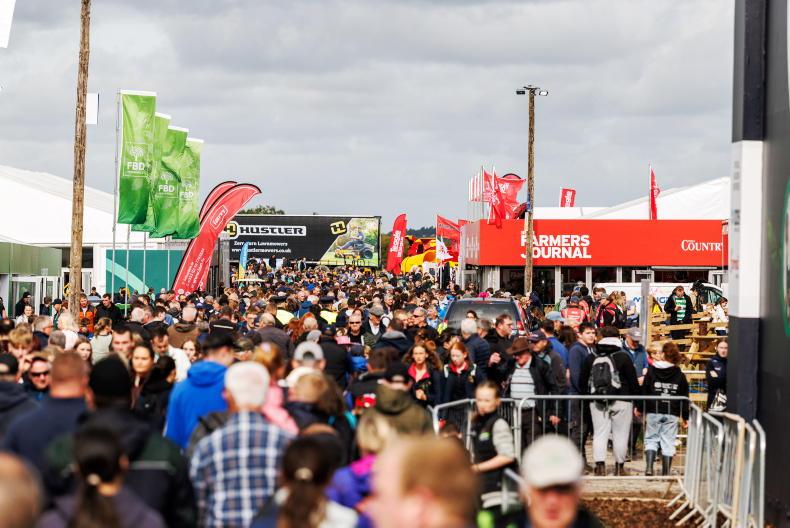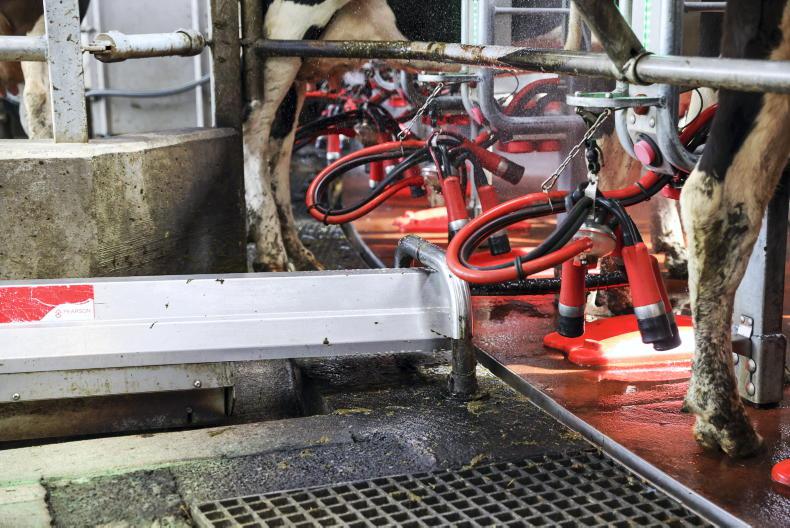In its first set of annual accounts covering the period after the merger with LacPatrick, Lakeland Dairies has reported operating profits of £17.53m on a turnover of £881m.
NI’s largest co-op processed 1.05bn litres of local milk in 2019, out of a total milk pool of 1.85bn litres across Ireland.
Speaking to the Irish Farmers Journal, Lakeland CEO Michael Hanley described the performance as “solid” and said he was satisfied that elements of the business which were previously part of LacPatrick were “performing to expectations”.
That includes the new £30m milk dryer at Artigarvan in Co Tyrone, where Lakeland has continued to invest over the last 18 months to bring it up to operational capacity.
It is the second-largest site within the business, after the Bailieborough milk drying plant in Co Cavan.
It is about processing the product that will give us the best return
The LacPatrick merger also brought a consumer foods business (liquid milk, cream, butter and cheese) into Lakeland, with direct links to retailers via the sites in Monaghan and Ballyrashane, Coleraine.
In addition, Lakeland operates the Pritchitts foodservice business in Newtownards, while the previous Armaghdown Creamery at Banbridge, bought off Fane Valley in 2016, is used for storage and operates on a seasonal basis, making butter. In total, Lakeland has four processing sites either side of the Irish border.
With the Lakeland milk pool growing around 3% per year, Hanley said that in the short-term, the co-op will be able to handle this growth, as there is still some latent capacity at Artigarvan.
“At peak, there is little spare capacity, but once we are through that, it is about processing the product that will give us the best return,” he said. However, he is still keen to take new entrant suppliers into the business, having seen 300 start-ups join (across both North and South) in the last five years.
Contracts
Between 7% and 10% of the Lakeland milk pool is currently on a fixed price contract, but the most recent contract, set at 26p/l in spring and summer, and 28p/l in autumn and winter, ends in December 2020.
“There is nothing in the pipeline, but we are always on the lookout if something suitable arises. You need a willing customer,” said Hanley.
He points out that it is the job of a farmer-owned co-op to pay out as much for every litre of milk as possible, while at the same time, covering costs, satisfying banks and having some capital available to continue to invest in the business.
As a result, he questions whether the Defra consultation on the issue of mandatory milk contracts really applies to a farmer-owned co-op in Ireland, where farmer suppliers elected to the board, set the price every month in consultation with management. The market is different in Britain, where private companies tend to dominate, so written contracts are more relevant.
Some farm leaders in NI have also suggested that a mandatory contract should include a requirement for farmers to know milk prices in advance, as routinely happens in Britain.
“NI is different. In Britain, the market is dominated by liquid milk contracts. But we sell into export markets. We don’t know what we are going to get two months in advance,” responded Hanley.
We hope to be back to 80% of normal sales by the year end
He also points out that even though farmers in Britain know the price in advance, processors also know what milk will be supplied in advance – if farmers produce over a certain level, that milk could be at a much lower price (A and B pricing).
“Be careful what you wish for,” he warned.
About one-quarter of revenues within the Lakeland business are in its foodservice division, which is mainly based at the Pritchitts facility in Newtownards, and specialises in the likes of small packs of butter and milk sticks for restaurants and other catering outlets.
Invariably, the lockdown due to coronavirus has hit sales hard.
“The second quarter of 2020 has been poor, but it is growing again – we hope to be back to 80% of normal sales by the year end,” said Michael Hanley.
However, the closure of food service outlets has benefited retail sales of dairy products. While the consumer foods division of Lakeland is relatively small (approximately 13.5% of total revenue), it has performed well during the lockdown.
Milk price
Looking ahead to what farmers can expect for milk prices over the next few months, Hanley maintained that markets started the year looking strong, but were hit negatively by COVID-19. The European Commission opening private storage aid for cheese, butter and skim in May did help stabilise returns, but that product in stores now casts a shadow on the market.
With European milk production looking strong over the next few months, he believes that both issues combined could act as a dampener on markets in the short-term.
Read more
Farmers benefited from fixed prices in 2019
Dairy farmers should know prices – Chestnutt
Legislation – is it required in dairy?
In its first set of annual accounts covering the period after the merger with LacPatrick, Lakeland Dairies has reported operating profits of £17.53m on a turnover of £881m.
NI’s largest co-op processed 1.05bn litres of local milk in 2019, out of a total milk pool of 1.85bn litres across Ireland.
Speaking to the Irish Farmers Journal, Lakeland CEO Michael Hanley described the performance as “solid” and said he was satisfied that elements of the business which were previously part of LacPatrick were “performing to expectations”.
That includes the new £30m milk dryer at Artigarvan in Co Tyrone, where Lakeland has continued to invest over the last 18 months to bring it up to operational capacity.
It is the second-largest site within the business, after the Bailieborough milk drying plant in Co Cavan.
It is about processing the product that will give us the best return
The LacPatrick merger also brought a consumer foods business (liquid milk, cream, butter and cheese) into Lakeland, with direct links to retailers via the sites in Monaghan and Ballyrashane, Coleraine.
In addition, Lakeland operates the Pritchitts foodservice business in Newtownards, while the previous Armaghdown Creamery at Banbridge, bought off Fane Valley in 2016, is used for storage and operates on a seasonal basis, making butter. In total, Lakeland has four processing sites either side of the Irish border.
With the Lakeland milk pool growing around 3% per year, Hanley said that in the short-term, the co-op will be able to handle this growth, as there is still some latent capacity at Artigarvan.
“At peak, there is little spare capacity, but once we are through that, it is about processing the product that will give us the best return,” he said. However, he is still keen to take new entrant suppliers into the business, having seen 300 start-ups join (across both North and South) in the last five years.
Contracts
Between 7% and 10% of the Lakeland milk pool is currently on a fixed price contract, but the most recent contract, set at 26p/l in spring and summer, and 28p/l in autumn and winter, ends in December 2020.
“There is nothing in the pipeline, but we are always on the lookout if something suitable arises. You need a willing customer,” said Hanley.
He points out that it is the job of a farmer-owned co-op to pay out as much for every litre of milk as possible, while at the same time, covering costs, satisfying banks and having some capital available to continue to invest in the business.
As a result, he questions whether the Defra consultation on the issue of mandatory milk contracts really applies to a farmer-owned co-op in Ireland, where farmer suppliers elected to the board, set the price every month in consultation with management. The market is different in Britain, where private companies tend to dominate, so written contracts are more relevant.
Some farm leaders in NI have also suggested that a mandatory contract should include a requirement for farmers to know milk prices in advance, as routinely happens in Britain.
“NI is different. In Britain, the market is dominated by liquid milk contracts. But we sell into export markets. We don’t know what we are going to get two months in advance,” responded Hanley.
We hope to be back to 80% of normal sales by the year end
He also points out that even though farmers in Britain know the price in advance, processors also know what milk will be supplied in advance – if farmers produce over a certain level, that milk could be at a much lower price (A and B pricing).
“Be careful what you wish for,” he warned.
About one-quarter of revenues within the Lakeland business are in its foodservice division, which is mainly based at the Pritchitts facility in Newtownards, and specialises in the likes of small packs of butter and milk sticks for restaurants and other catering outlets.
Invariably, the lockdown due to coronavirus has hit sales hard.
“The second quarter of 2020 has been poor, but it is growing again – we hope to be back to 80% of normal sales by the year end,” said Michael Hanley.
However, the closure of food service outlets has benefited retail sales of dairy products. While the consumer foods division of Lakeland is relatively small (approximately 13.5% of total revenue), it has performed well during the lockdown.
Milk price
Looking ahead to what farmers can expect for milk prices over the next few months, Hanley maintained that markets started the year looking strong, but were hit negatively by COVID-19. The European Commission opening private storage aid for cheese, butter and skim in May did help stabilise returns, but that product in stores now casts a shadow on the market.
With European milk production looking strong over the next few months, he believes that both issues combined could act as a dampener on markets in the short-term.
Read more
Farmers benefited from fixed prices in 2019
Dairy farmers should know prices – Chestnutt
Legislation – is it required in dairy?









SHARING OPTIONS